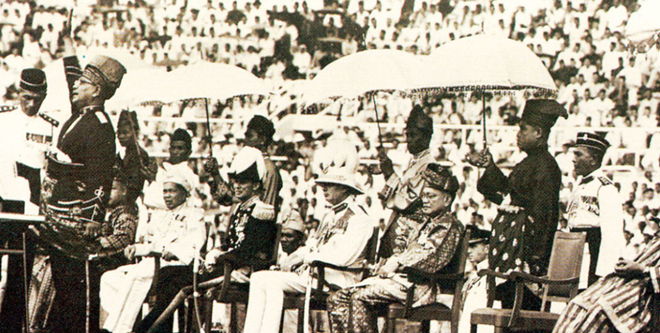
Peter (centre) holds a banner together with the gathering’s organising chairman Bill Jugah (left) at Sarawak Museum in Kuching.
KUCHING:
Sarawakians should not take the Sarawak Day celebration for granted as
the fight for full recognition under the Malaysia Agreement 1963 (MA63)
is still in its beginning.
Sarawak for Sarawakians (S4S)
spokesperson and activist Peter John Jaban said over the last three
years, the state has seen enormous positive steps – from the
establishment of a homegrown taskforce to address the issues involving
stateless individuals, to the announcement of a team heading for London
to examine the state’s legal position under MA63.
“We still face
problems with finance from the federal government – from oil revenues,
tourism tax to stamp duty; we still face attacks against our religious
freedom; our cultural uniqueness is still being ignored, in view of a
recent announcement stating that police personnel would be banned from
having tattoos,” said Peter, who was one of the speakers at a peaceful
gathering at Sarawak Museum ground here yesterday.
The rally, run
by S4S together with Sarawak Dayak Iban Association (Sadia), gathered
around 100 participants who were required to wear ‘red’ – both to
signify solidarity and also the situation of which Sarawakians ‘are
still seeing red over’.
“Sarawakians must stand together to show
that we support the state government’s direction, that we still see the
problems in our state and that we no longer accept the status quo,”
Peter said.
According to him, Chief Minister Datuk Amar Abang
Johari Tun Openg has taken on the mantle of ‘Tok Nan’ – the state’s
fifth chief minister Datuk Patinggi Tan Sri Adenan Satem, who passed
away on Jan 11 this year.
He said both leaders had created an
atmosphere in which Sarawakians could openly consider their position in
Malaysia and demand for their fair share.
“The Sarawak pride soars
high with the flying of our flag, the promotion of our own languages
and even the wearing of traditional tattoos.
“We have been given an example of what is possible when the state is given charge of its own issues,” he pointed out.
Peter
said among the issues being addressed was those involving stateless
individuals – the taskforce upon which was spearheaded by Welfare,
Community Well Being, Women, Family and Childhood Development Minister
Datuk Fatimah Abdullah.
This taskforce, added Peter, is actively
seeking to redress the long-term stateless individuals in Sarawak,
especially the children.
“We have also seen other representatives
such as our Minister of Tourism, Arts, Culture, Youth and Sports Datuk
Abdul Karim Hamzah, who stands up for our rights and bravely faces up to
the abuse from a federal minister on our behalf. Indeed, we should give
thanks for this.
“However, the progress so far is largely in ideals – the concrete gains are yet to come.”
Peter
said just recently, an edict issued by the Inspector-General of Police
stated that policemen would be banned from having tattoos, despite the
practice being age-old tradition of many tribes in Sarawak.
Sarawak,
he stressed, is one of the oldest tattooing cultures in the world –one
that is revered as a mark of a great warrior, communicating status and
conferring protection on the wearers.
“Now, thankfully, the
cultural importance of tattoos is being rediscovered and they are
becoming one of our most important tourism exports. Yet, the police
force is creating a rule that will prevent a new generation of young
Sarawak ‘warriors’ from entering the service.
“This is like asking
a Sikh to remove his turban – a lack of cultural understanding at best
and cultural discrimination at worst,” he added.





